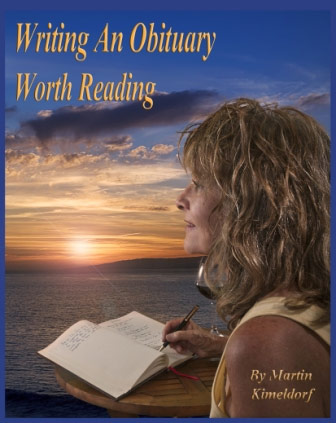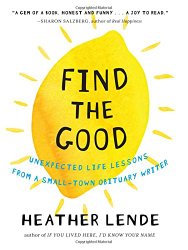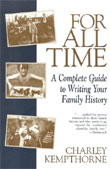A Family History Writing Workshop
August 14, 2012
David McConkey
I am fortunate to be attending one of Charley Kempthorne’s family
history writing workshops. About 30 of us had signed up in advance and
we show up on a warm August morning at the public library in Brandon,
Manitoba. (Originally limited to 15, it had been quickly
oversubscribed, so the number was expanded.)
We are of an experienced,
mature age. Apparently typically, the group is 90% women.
For the next two hours, Charley entertains and encourages us with his
wit and wisdom. When we aren’t laughing, we are learning, reflecting .
. . and writing.
Whereas a memoir is the story of one individual, a family history is
the story of a group. Charley notes the importance of this genre of
writing: for the wider community, yes, but mostly for one’s own family.
Your
descendants will want to hear your family’s story; if you don’t write
it down, they won’t have that story.
A big stumbling block for most people is a fear of making mistakes.
Charley, a former teacher, explains that this reticence is a leftover
of the school’s emphasis on correctness. Charley makes the comment that
most people – even those who attend his workshops – are so afraid of
making a mistake that they will not write a single line. I wonder if
Charley says this as a kind of reverse psychology, as a way to instill
a challenge in us.
Like any narrative, a family history is a series of scenes – much like
a movie. At one point, Charley asks us to recall one such scene from
our own family history, and gives us 20 minutes to write it down. He
then invites each of us in turn to read aloud what we have just
written. (Anyone who feels at all reluctant can simply pass.)
As we go around the room, scene descriptions come tumbling
out. I
sense we are all astounded at how articulate a group of ordinary people
can be. The scenes range from the everyday to the unusual to the really
quite moving. It is easy to imagine how such scenes could grow into
full-fledged family histories.
Charley is overflowing with ideas, tips, and suggestions; he has been
doing this since 1976. From his home in Kansas, he travels the U.S. and
Canada leading hundreds of workshops.
As well, he
has written a book, For
All Time: A Complete Guide to Writing Your Family History. He puts
out a regular interactive newsletter, LifeStory.
To enhance his work, he has established the LifeStory
Institute.
Some of his specific suggestions for aspiring family historians:
- Don’t get bogged down staring at a blank piece of paper. To spark ideas, draw a picture of the house you grew up in, and note whatever remembrances come to mind. Or: look at old photographs, and add captions.
- Write even a small amount daily. 500 words a day could actually produce a couple of books in a year!
- Don’t think, write! As Charley says,
“The point is not to write well, but to write at all.”
- Forget about quality. "Don’t write your last draft first."
- Always carry around a small notebook to jot down thoughts at any time.
- Starting is important. Pick a specific thing and write about it: something small could end up becoming very significant.
After all, we already have written one scene.
More From Obituary Guide:
- Writing Your Own Obituary Offers Chance for Reflection
- How to Write a Legacy Letter (Ethical Will)
- A Family History Writing Workshop
- Helping Families "Most Satisfying Work" for Funeral Celebrant
- Be Prepared: Will, Health Care Directive (Living Will), and More
Books You May Find of Interest:
Not Quite What I Was Planning:
Six-Word Memoirs

Writing an Obituary Worth Reading:
A Guide to Writing a Fulfilling Life Review

Find the Good:
Unexpected Life lessons From a Small-Town
Obituary Writer

Having the Last Say:
Capturing Your Legacy in One Small Story

Obit:
Inspiring Stories of Ordinary People Who Led Extraordinary Lives
For All Time:
A Complete Guide to Writing Your Family History

Thrive:
The Third Metric to Redefining Success and Creating a Life of
Well-Being, Wisdom, and Wonder

Press Ctrl + D to Bookmark this page

